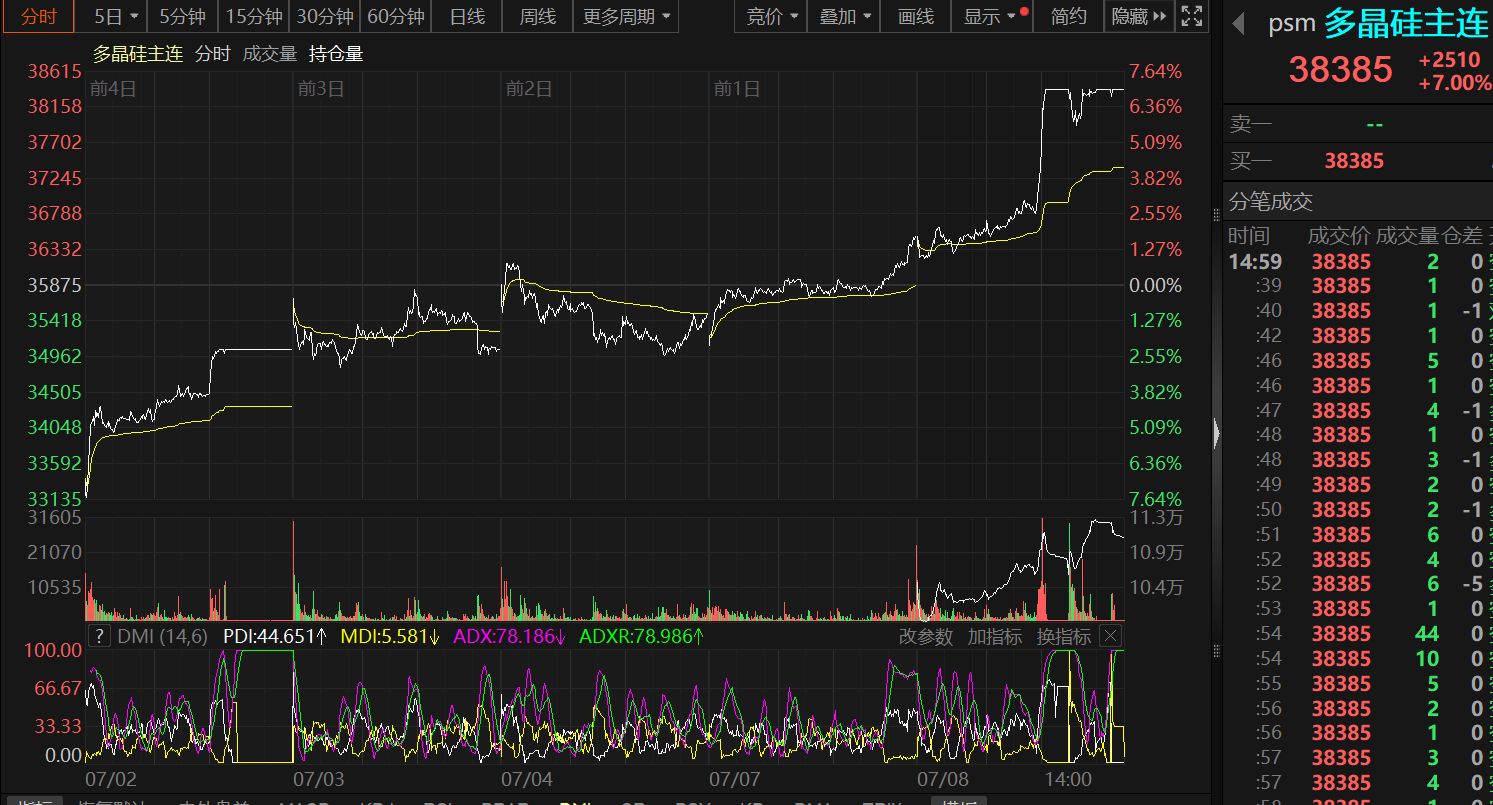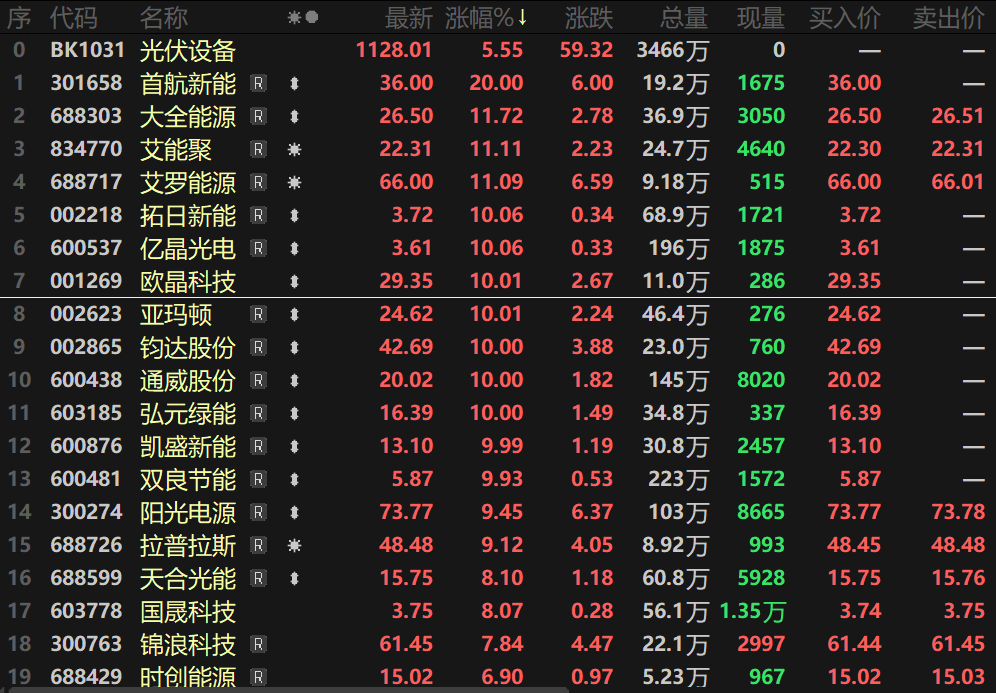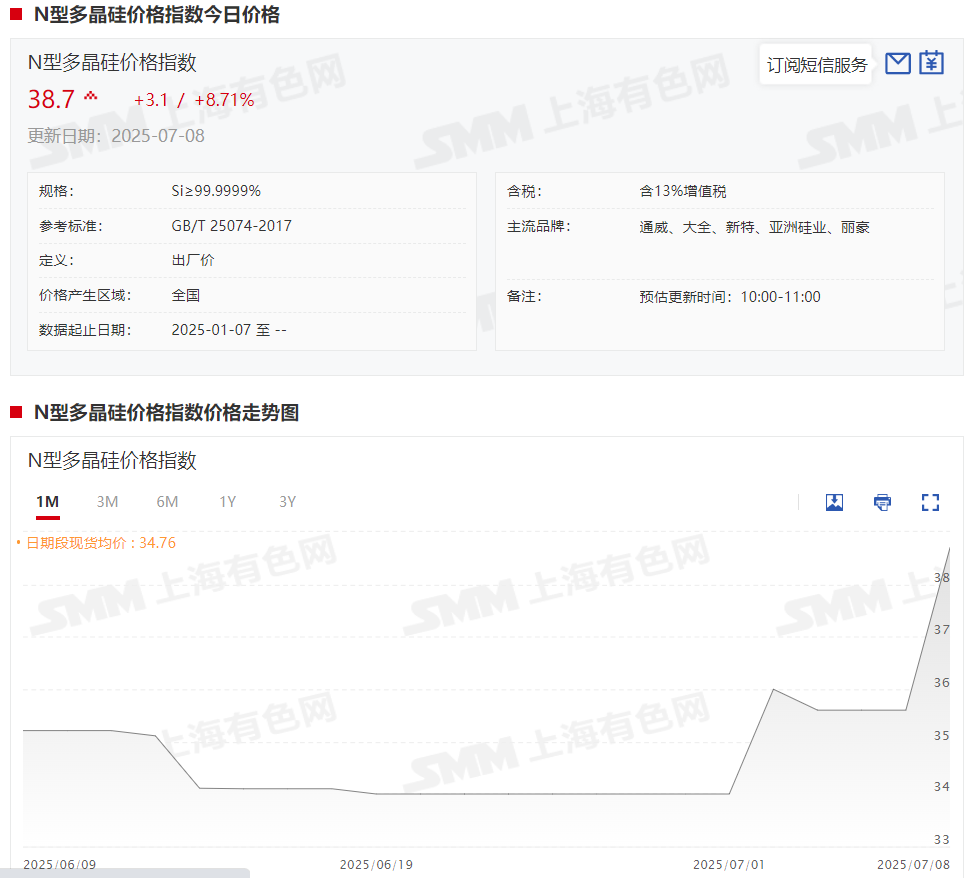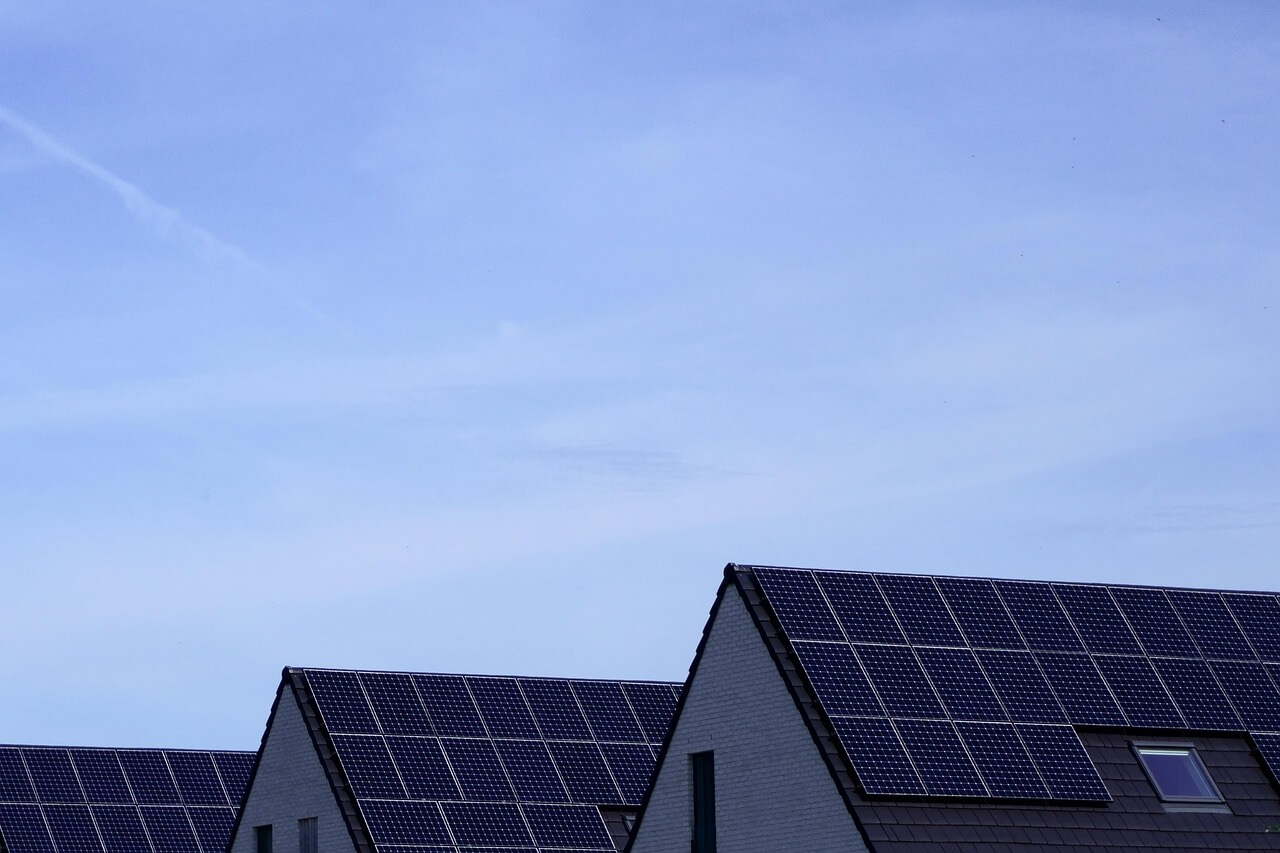SMM July 8 news: In early trading on July 8, the polysilicon main futures contract opened higher and continued to rise, surging to the daily limit of 7% by 13:35 and closing at 38,385 yuan/mt. Following the previous limit-up on July 2, the polysilicon main futures achieved the remarkable feat of "two limit-ups in five trading days."

Against the backdrop of the polysilicon futures rally, the PV equipment sector index also climbed significantly, gaining nearly 6% intraday. Individual stocks saw a wave of limit-ups, with over 9 stocks including Topray Solar, EGing PV, OJing Technology, Junda Shares, Tongwei, and Shuangliang Energy-Saving hitting the limit-up. The sector closed up 5.55% for the day.

Spot polysilicon prices also rose sharply. According to SMM spot quotes, the N-type polysilicon price index increased by 3.1 yuan/kg to 38.7 yuan/kg, a single-day gain of 8.71%.
》Click to view SMM PV product spot prices
Mixed market news fueled continued bullish sentiment. SMM learned that polysilicon price expectations were significantly revised upward today. Since yesterday, major polysilicon producers began calculating their full costs, with many temporarily suspending price quotes. Market expectations point to prices exceeding 39-40 yuan/kg based on full cost calculations.
This situation is closely tied to the PV industry's self-regulation and response to the government's repeated "anti-cut-throat competition" policies. Since late June, national-level policies and directives against cut-throat competition have proliferated. On June 27, 2025, the 16th meeting of the 14th NPC Standing Committee passed the revised Anti-Unfair Competition Law, effective October 15, 2025, explicitly targeting "cut-throat" competition. It strengthens fair competition reviews, ensures equal market participation, and prohibits platform operators from forcing below-cost sales. On June 29, People's Daily published a front-page commentary titled "Achieving High-Quality Development by Eliminating Cut-Throat Competition," specifically mentioning PV and ESS sector irregularities. On July 1, at the 6th meeting of the Central Financial and Economic Affairs Commission, President Xi Jinping emphasized "regulating enterprises' low-price disorderly competition according to law."
On July 3, MIIT held the 15th manufacturing enterprise symposium, inviting 14 PV companies and industry association representatives to discuss operations, innovation, competition, and ecosystem development, while presenting challenges and policy recommendations. Party Secretary and Minister of the Ministry of Industry and Information Technology (MIIT), Lecheng Li, emphasized the need for comprehensive governance of low-price disorderly competition in the PV industry, guiding enterprises to enhance product quality, and promoting the orderly exit of outdated capacity. The MIIT will further strengthen macro guidance and industry governance, enhance standard leadership and service guarantees, and continuously assist enterprises in resolving urgent and difficult issues, safeguarding the high-quality development of the PV industry. Following the "anti-cut-throat competition" symposium for PV enterprises held by the MIIT on July 3, multiple media outlets reported that leading enterprises in the PV industry chain, including LONGi, Trinasolar, and Jinko Solar, collectively pledged to actively participate in the "anti-cut-throat competition" initiative.
On July 5, the MIIT's official WeChat account published an article from the Qiushi Journal titled "Deep Understanding and Comprehensive Governance of 'Cut-throat Competition'," which detailed the causes and harms of "cut-throat competition," continuing to sound the alarm for the industry. Currently, based on official statements from Qiushi, People's Daily, and the MIIT, key industries targeted for "anti-cut-throat competition" may include PV, lithium battery, NEV, and e-commerce platforms.
Returning to the current polysilicon market, according to SMM, polysilicon production in July is likely to increase overall, though the growth may be limited. Inventory-wise, polysilicon still faces significant pressure, with total market inventory exceeding three months. Attention should be paid to the production schedules of upstream polysilicon enterprises under the "anti-cut-throat competition" backdrop, as well as downstream demand performance and policy-driven market momentum.
Institutional Comments
Huaxi Securitiescommented that important newspapers, the Financial and Economic Affairs Commission, and relevant ministry symposiums reflect the heightened attention to the supply-side surplus in the PV industry, and the implementation of subsequent specific measures is anticipated.China Galaxy Securitiesnoted in its research report that "policy + industry self-discipline + production cuts" will drive supply-side reforms, and the PV industry is expected to become a model for the central government to break "cut-throat competition" and achieve high-quality development, with the industry likely to see supply-demand improvements.
Min Sheng Securities' research reportargued that current PV industry prices and profits are at bottom levels, and high-level officials' frequent statements aim to redirect disorderly "price war"-style "cut-throat competition" back to the track of innovation-driven, value-based competition. It is optimistic that policy and industry self-discipline will synergize to promote the exit of surplus PV capacity, effectively improving the supply-demand pattern, with the industry poised for a rebound.
Pacific Securitiespointed out that the "anti-cut-throat competition" rhetoric has been frequently voiced recently. The high-level decision to combat "cut-throat competition" in the PV industry carries a strong signaling significance, and is expected to accelerate the exit of supply-side capacity from the market, while also forcing breakthroughs in new technologies. The PV industry is expected to usher in a turning point. Under the "anti-cut-throat competition" policy, the PV industry will shift from a "price war" to "technological differentiation," optimizing the capacity structure and accelerating technological progress, thereby driving equipment demand.
Guotai Junan Securities stated that the current policy guidance is expected to alleviate the disorderly expansion and improve the supply and demand structure of the industry. The PV sector is already at a relatively low level, and attention can be paid to the allocation value of leading enterprises in capacity optimization and technological upgrading.


![[SMM PV News] Armenia Hits 1.1 GW Solar Capacity,](https://imgqn.smm.cn/usercenter/qQwIB20251217171741.jpg)
![Spot Market and Domestic Inventory Brief Review (February 5, 2026) [SMM Silver Market Weekly Review]](https://imgqn.smm.cn/usercenter/tSwaX20251217171735.jpg)
